
A true rising star of the horror and fantasy genre, Tim Lebbon has been racking up fans and sales for over a decade now, resulting in New York Times bestseller status with the novelisation of 30 Days of Night.
Paul Kane: How did your love of horror – both in films and literature – develop in your formative years?
Tim Lebbon: I enjoyed reading from a very early age, and it was always the scary stuff that caught my imagination. I read a series of books by Willard Price when I was 8 or 9, adventure books about two brothers travelling the globe and collecting animals for their father’s zoo. Cannibal Adventure was perhaps my favourite, for the obvious reasons. At about 10 or 11 years old I started reading James Herbert, enjoying taking the books to school to read out the gory and sexy bits to my mates, then in my early teens I discovered Stephen King … and never looked back. Screen-wise, when I was a kid my favourite TV programme was called Children of the Stones. I’ve never revisited, because I’m sure I’ll be disappointed, but I remember this series having the most terrifying title sequence, and a really eerie feel. I also loved Tales of the Unexpected, and from Nigel Kneale’s Beasts, the episode ‘Baby’ gave me terrible nightmares. And, in fact, I saw that episode recently, and I’m delighted to say it scared the shit out of me.
Paul Kane: You’ve mentioned finishing writing your first book at nine – what was the motivation for this and what can you remember about it?
Tim Lebbon: I always loved telling stories. I can’t remember a lot about the book – actually I suspect it was short-story length in one of my old school exercise books – but I think it was an action story with some weird supernatural elements. The drive to write was present even then, and that drive slowly resolved into a need.
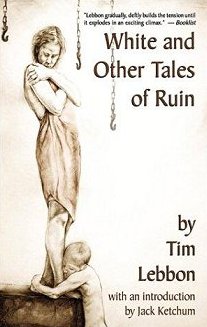
Paul Kane: White is the novella that a lot of people remember you for from those days – again, how where did the initial idea for that come about, and are you excited about it being turned into a movie?
Tim Lebbon: Andy Fairclough, who used to run the excellent Masters of Terror website, wanted to start up his own publisher, MoT Press, and he asked me to write his first title. Naturally, I was thrilled. I’d always wanted to write an intense siege story – I’m a big fan of The Thing, Assault on Precinct 13, Dawn of the Dead etc – so I saw this as my chance. I remember being uncertain about just what I’d written … whether it was even any good … but Andy seemed pleased with it. White went on to win the British Fantasy Award, be reprinted in the two big Year’s Best anthologies, as well as a couple of my collections, and now it’s set to be a Hollywood movie. So it can’t have been that bad.
I’m thrilled about the movie, of course. And what’s important to me is Stephen Susco’s vision (he’s the Hollywood writer who’s had the option for several years). There was always the potential for White to be a stalk and slash movie, but Stephen has a real understanding of, and passion for the story; its spookiness and claustrophobia. I’m fairly certain we shall be seeing no escaped lunatics in masks in the eventual big screen version.
Paul Kane: As The Sun Goes Down (2000) gathered together many of your shorts – did you have a particular favourite and how did you decide which stories to include?
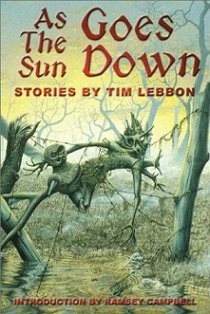
Tim Lebbon: Night Shade approached me about this after I met them at the World Horror Convention in Denver. I wanted to collect the best of the short stories I’d had published or had written thus far, and that was pretty much how I chose them. But I came up a little short on material I thought was good enough to make it into a collection. So I wrote the novella ‘The Unfortunate’, which is a novella I’m still very, very pleased with, and it’s definitely my favourite from the collection.
Paul Kane: The scenario for The Nature of Balance is very ‘post apocalyptic’; were you influenced by writers such as Wyndham, Matheson and King for that one? And what is your all-time favourite dystopian future?
Tim Lebbon: Ah yes, see above. Wyndham certainly, and yes, I’m also a big fan of The Stand (and also Matheson, although I didn’t read I Am Legend until after I’d written The Nature of Balance). As for favourite dystopian future …? I’d have to plump for Wyndham’s wonderfully and imaginatively realised Triffid apocalypse. Only he could have made giant plants so scary.
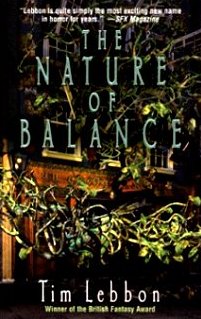
Paul Kane: What was it like to win your very first award?
Tim Lebbon: What a day. That was the British Fantasy Award for White. At the awards banquet I was sitting on a table with Graham Joyce on one side of me, and Pete Crowther on the other. Joyce won for Best Novel (again … talented bastard), Crowther won for Best Collection, and that’s when I completely lost hope. What was the chance of three people sitting next to each other on the same table winning three major awards? So when it was my name called out, it took my breath away. Much as I wanted to hang around after and have a celebratory drink, I was having a lift home, and my lift had to leave within about ten minutes. Gutting. But I nursed that little trophy all the way home.
Paul Kane: You have a real love for Machen – which stories of his are your favourites and how did the idea for doing Exorcising Angels with Simon Clark come about?
Tim Lebbon: My favourite Machen story is his novel, The Hill of Dreams. It’s just beautiful. The Great God Pan and The White People are also essential reading. As for the collaboration with Simon…maybe six or seven years ago, we worked up a proposal for a TV series/screenplay based on Machen’s ‘The Bowmen’ story, and how it inspired the WWI legend of the Angels of Mons. We never got anywhere with it, but when Paul Miller at Earthling asked us to collaborate on a novella for him, it was the first thing we both thought of. It was a really interesting process – I think Simon and I have quite dissimilar styles, and Exorcising Angels came out very different from anything either of us would have written. It’s a novella I’m still very, very proud of, and I think the title itself is great. It’s also currently under option, and things seem to be moving forward a little, so who knows, one day we might see this one on the big screen.
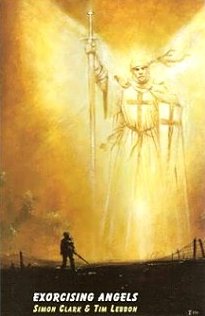
Paul Kane: Did having kids make it harder or easier to write about the subject of children in danger or – indeed – the loss of a child, as in Berserk?
Tim Lebbon: It made it much harder to write about this sort of stuff, but also made what I did write much more effective. Face was the first novel I wrote after becoming a dad, and it was monstrously difficult writing some of those scenes. I think that’s something that anyone with a hint of imagination suffers from…a greater understanding of things that can go wrong. You’re presented with this tiny human being who relies on you totally and utterly, and the world suddenly seemed like a much more dangerous place. Having kids makes you grow up, and it’s inevitable that it reflects in your writing.
Paul Kane: Turning to Dusk and Dawn, you’ve said before that you don’t really read that much fantasy – did this help or hinder you when developing your world of Noreela?
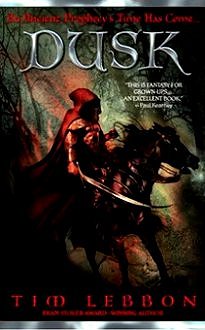
Tim Lebbon: I like to think it helped. In reality, I think it was both a help and a hindrance. Those books really polarised opinion from readers: some hated them, and thought they were clichéd monstrosities; others wrote to tell me they had reinvigorated the genre. Obviously reaction like that is much better than apathy, and the rationale behind both viewpoints interests me. I think having not read much fantasy allowed me more free reign with what I thought I could and couldn’t do. One of my aims was to create my very own, unique fantasy world. Why bother creating what is essentially a whole new universe – with all the wonderful possibilities that entails – if I populate it with dragons, elves and warrior princes? So I let my imagination run wild, and came up with all sorts of weird stuff: drug mines, sentient tumbleweed, magical machines, Sleeping Gods, skull ravens, sex drugs distilled from the liver of a thing called a furbat…Lots of twisted fun. Conversely, other readers said I’d plumbed the cliché-mines of modern fantasy, and that for having my main character as an innocent farm boy who becomes the centre of a world’s fate, I should be taken out and shot.
Paul Kane: What can you tell us about the latest release in the series from Subterranean Press, After the War?
Tim Lebbon: This is a volume of two novellas set in the same world of Noreela. They both take place before Dusk and Dawn, between the time of the Cataclysmic War – when magic left the land – and the opening events of Dusk. They’re stand-alone stories, so you won’t need to have read any other Noreela stories to enjoy them. Vale of Blood Roses is set quite soon after the war, and it follows a band of mercenaries on their way home … trouble is, some of them don’t want the fight to be over. The Bajuman is set a couple of hundred years later, after the Great Plagues (which were alluded to in Dusk). It’s a noir fantasy tale, I guess. I had fun writing these, and I have ideas for plenty more stories and novellas, as well as novels, set in Noreela. In fact, just yesterday I typed ‘The End’ on the fourth novel, The Island.
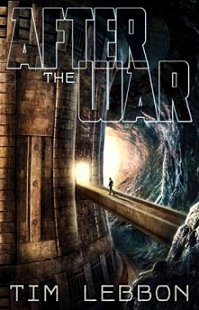
Paul Kane: Do you still consider yourself a horror writer at heart, though?
Tim Lebbon: I’m a writer. Some of my stuff is horror, some fantasy, and sometime in the future I might write a crime novel, or something more mainstream. I love writing, and it happens that much of what I write tends to be quite dark. That’s just the way my parents put my hat on.
Paul Kane: How did it feel when you finally became a full time writer?
Tim Lebbon: I’d been a full-time writer in my head for years, but finally being able to earn a living from it, and spend all my time doing it, is bloody wonderful. It took a long time.
Paul Kane: You’re certainly prolific, how do you find the time to write as much as you do – especially with a family – and do you wonder how you fitted a day job in now, looking back?
Tim Lebbon: Yes, looking back I can’t understand how I wrote all those books, especially when I was still working full-time. Maybe I sold my soul to the devil without remembering. I think I’m lucky in that once I begin something, I can write quite quickly. And now that I’m full-time, I have to work with a different hat on sometimes…write enough to pay the mortgage, keep myself in coffee, buy my kids new shoes. Dunno why they can’t just cut the toes out of the old ones.
Paul Kane: Of all the great quotes you’ve amassed, which has been your particular favourite?
Tim Lebbon: It’s from SFX magazine: ‘Lebbon is quite simply the most exciting new name in horror for years.’ Actually that was written several years ago, so I’m not quite sure how much longer I can dine out on that one.
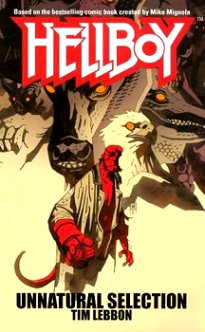
Paul Kane: Were you apprehensive approaching the world of Hellboy, and were you a fan of the series beforehand?
Tim Lebbon: I was aware of Hellboy, but I hadn’t read all the graphic novels, no. When Chris Golden asked me for a short story for Odder Jobs, I took it as a bit of a challenge – I’m pretty sure that was the first time I’d written something in someone else’s world. Then when the offer of the novel came along, I leapt at it. I was excited rather than apprehensive, and Mike Mignola was very generous with what he allowed me to write. Hellboy: Unnatural Selection was a large scale, globe-trotting story with an apocalyptic feel, quite different from the graphic novels. Loads of fun, and I still feel quite honoured having had the chance to write it.
Paul Kane: How did you get the gig writing the novelisation of 30 Days of Night and what was this experience like?
Tim Lebbon: This came directly from me writing the Hellboy novel (they’re both published by Pocket Books). I loved it – I had freedom to add scenes, characterisation and dialogue, as long as I didn’t take anything away from the script. So I put in a polar bear scene, and a load more interaction to develop the characters. Adapting from a screenplay was a really interesting process, and the book has gone down really well. I’m sure I’ll do it again someday.
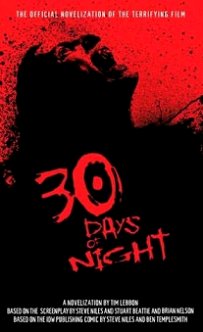
Paul Kane: How did it feel when the novelisation reached the New York Times bestseller list?
Tim Lebbon: Ahhh, that was nice, and a surprise that took my breath away. My agent rang me with that news just an hour after calling to say we’d sold Dusk and Dawn in Germany. That was a good evening.
You can find out more at Tim’s website http://www.timlebbon.net/
© Tim Lebbon and Paul Kane 2008